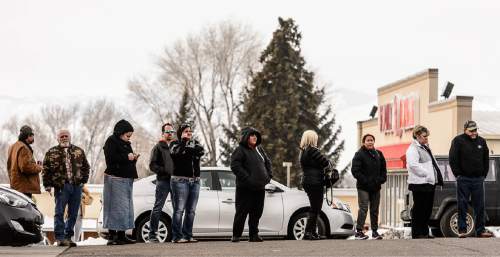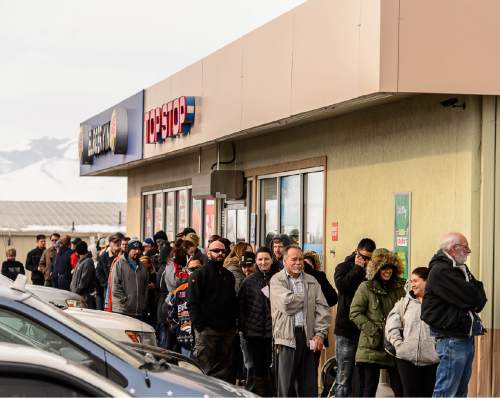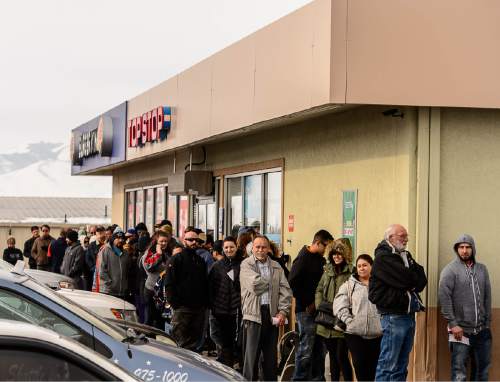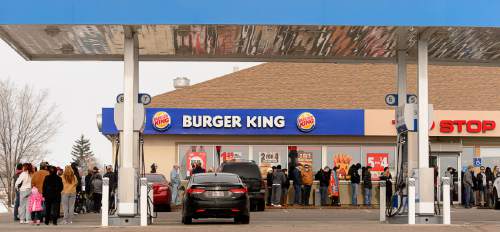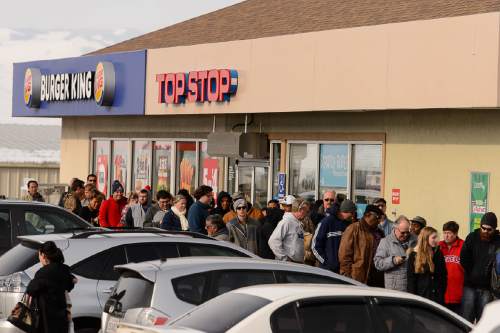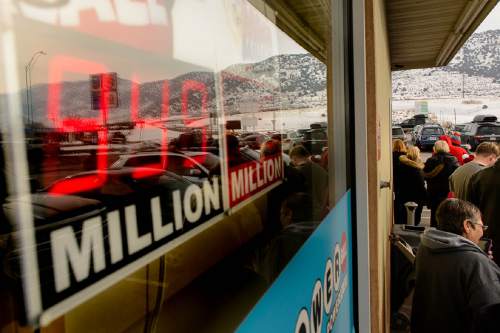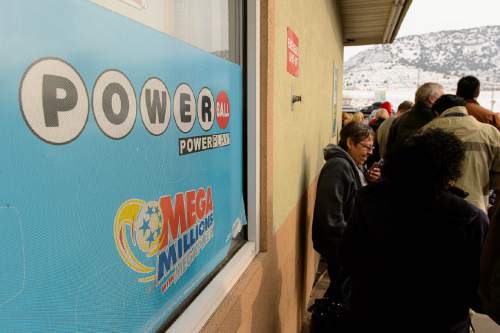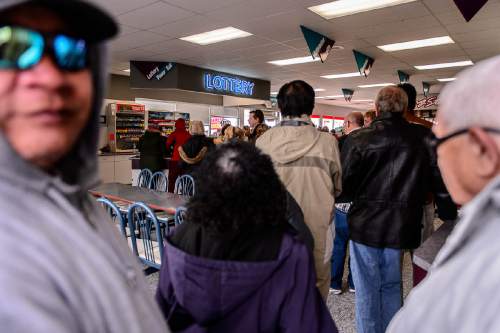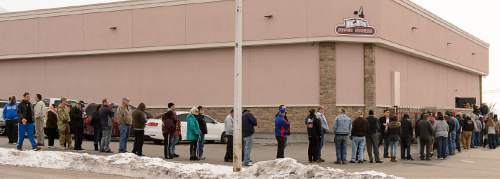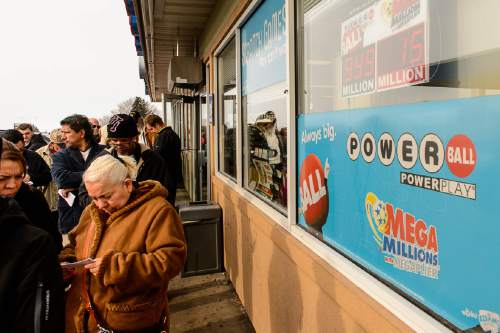This is an archived article that was published on sltrib.com in 2016, and information in the article may be outdated. It is provided only for personal research purposes and may not be reprinted.
Malad, Idaho • At Idaho's No. 1 seller of lottery tickets, the day before the largest jackpot in world history was an orderly scene.
Six cashiers worked eight registers — one scarcely used, reserved for locals buying gas and groceries at what was until recently the modest gas station store you'd expect in a town of 2,100 people.
Now 10,000 square feet — or twice the size of a large Maverik — KJ's Kwik Stop is built expressly for crowds like Tuesday's, which continued out back through a loading area and wrapped around the mammoth store. Cashiers didn't appear harried as they explained to lottery novices that lines are $2 apiece and they must pay cash.
KJ's lone failing on the occasion: A three-digit sign above the front entrance read "999." Wednesday's estimated jackpot is $501 million too large for the marquee.
"I think we're going to see this a lot more often," said District Manager Gregg Green, who's heard Utah patrons complain that a $40 million jackpot wasn't worth the trip north on Interstate 15. More numbers were added to the Powerball ticket in October, lowering the odds of a winning ticket from 1 in 175 million to 1 in 292 million. That means juicier jackpots and, Green believes, better sales for stores like his.
Across the street from Malad's Kwik Stop, at an equally bustling Chevron, a monitor informed Tuesday's entrants that Idaho's lottery has raised $650 million for schools and buildings since its inception in 1990. The postscript: "Thanks, Idaho."
But much of the thanks is owed to Utahns. Idaho lottery spokesman David Workman said locations along the Utah border accounted for about 21 percent of Powerball sales last week, as the jackpot approached $1 billion.
Wyoming's Uinta County, and its seat Evanston, is home to less than 4 percent of the state's population, but it was responsible for 34 percent of the state's lottery sales last week, according to WyoLotto senior research analyst Justin Ballard. The county has accounted for 18 percent of the state's total sales since the lottery went live in August 2014.
The Utah visitors are nicknamed "lotto-day saints" by Dinosaur, Colo.'s Laurie Roybal, who estimates she's seen 20 to 30 times the usual crowd as a manager at Gateway Service. Other cross-border hotspots include Fruita, Colo., on Interstate 70 and Littlefield, Ariz., on I-15 South, with stores that rank among their states' top sellers. Malad's Kwik Stop and Chevron and Franklin's La Tienda, on U.S. 91, are perennially Nos. 1, 2 and 3 out of about 1,200 Idaho locations, Workman said.
When Tremonton's Robert Green bought Malad's unassuming Kwik Stop in 1991, "we thought he was crazy," said Gregg, his son, who has helped run the store with brothers Geoff and Bobby since their father's retirement in the early 2000s. The Green brothers sold Kwik Stop to KJ's a few years back and demolished seven nearby houses to build their lottery mecca.
The demand is such that one Reddit user attempted this week — illegally — to sell tickets secondhand for $10 a pop.
Green said he has many regulars who buy up to 10 draws in advance, but Tuesday's crowd was predominantly made up of "people that've never played before ... that are caught up in the hype and the media."
Murray's Georgia Hendricks and Sharon Glanville, co-owners of Rustic Spoonful and High Desert Rust, took a selfie holding their tickets at Malad's Chevron on Tuesday morning.
Hendricks, who also purchased tickets for her brother and a friend, said her first order of business as a billionaire will be to give 100 people a million dollars each.
Chimed in Glanville, "And then I said to her, 'You still have, like, a whole lot left.' "
One customer declined to be named because he'd called in sick to buy tickets. West Jordan's Tony Hopkins, freshly retired after 35 years at the IRS, said a $2 ticket is a wise investment. For $2, he said, you can dream.
"If you don't play, you're guaranteed to lose," Hopkins said. "If you do play, you're pretty much guaranteed to lose, but you have as equal a chance as anybody else — it doesn't distinguish between race, religion, wealth — and you can't win if you don't play."
Utah is one of just six states that doesn't host a lottery, along with Alabama, Alaska, Hawaii, Mississippi and Nevada.
A Utah lottery would be a nightmare for border towns sucha s Malad, but families like the Greens aren't likely to lose too much sleep over the prospect. Utah's constitution bans all games of chance. It would require a two-thirds majority in both legislative houses and by voters to approve an amendment, and almost as many voters identify as Mormons. The LDS Church urges members to oppose government sponsorship of gambling.
At least Utahns have a new option in Wyoming — an hour and 15 minutes from Salt Lake City, compared with the hour-and-30-minute drive to Malad. An added bonus: Wyoming is one of the few states that offers anonymity to its winners.
Dawn Darby, executive director of Evanston's chamber of commerce, said Utahns not only buy lottery tickets, they also stop to eat and visit retailers. Locals complained last Saturday that they weren't able to access the gas pumps because there were so many cars from Utah.
Sales remain strong for Malad and Franklin, though, accounting for as great a portion of Idaho's sales as they did in 2011, when The Tribune previously analyzed sales data.
Hopkins said he only learned last week that Wyoming offered tickets. Nicola Taylor, who once lived in Laramie, Wyo., said Tuesday that she prefers the valley floor drive to Idaho to the sometimes-white-knuckle canyon route to Evanston. An England native, Taylor is a frequent customer who would use the winnings to bring her grandmother to the U.S. for care.
Hopkins, like Taylor and more than 3,000 people who "liked" a Facebook petition to establish a Utah lottery, wished Utah would rethink its resistance to the game.
"It's ridiculous," he said. "Utah's losing all this money."
mpiper@sltrib.com Twitter: @matthew_piper


